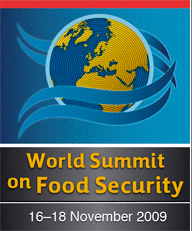
Extreme poverty is the most severe type of poverty, defined by the United Nations (UN) as "a condition characterized by severe deprivation of basic human needs, including food, safe drinking water, sanitation facilities, health, shelter, education and information. It depends not only on income but also on access to services". Historically, other definitions have been proposed within the United Nations.

The Food and Agriculture Organization of the United Nations (FAO) is a specialized agency of the United Nations that leads international efforts to defeat hunger and improve nutrition and food security. Its Latin motto, fiat panis, translates to "let there be bread". It was founded on 16 October 1945.

In politics, humanitarian aid, and the social sciences, hunger is defined as a condition in which a person does not have the physical or financial capability to eat sufficient food to meet basic nutritional needs for a sustained period. In the field of hunger relief, the the term hunger is used in a sense that goes beyond the common desire for food that all humans experience, also known as an appetite. The most extreme form of hunger, when malnutrition is widespread, and when people have started dying of starvation through lack of access to sufficient, nutritious food, leads to a declaration of famine.

Starvation is a severe deficiency in caloric energy intake, below the level needed to maintain an organism's life. It is the most extreme form of malnutrition. In humans, prolonged starvation can cause permanent organ damage and eventually, death. The term inanition refers to the symptoms and effects of starvation. Starvation is a crime according to international criminal law and may also be used as a means of torture or execution.

Food security is the availability of food in a country and the ability of individuals within that country (region) to access, afford, and source adequate foodstuff. According to the United Nations Committee on World Food Security, food security is defined as meaning that all people, at all times, have physical, social, and economic access to sufficient, safe, and nutritious food that meets their food preferences and dietary needs for an active and healthy life. The availability of food irrespective of class, gender or region is another element of food security. There is evidence of food security being a concern many thousands of years ago, with central authorities in ancient China and ancient Egypt being known to release food from storage in times of famine. At the 1974 World Food Conference, the term "food security" was defined with an emphasis on supply; food security is defined as the "availability at all times of adequate, nourishing, diverse, balanced and moderate world food supplies of basic foodstuff to sustain a steady expansion of food consumption and to offset the fluctuations in production and prices". Later definitions added demand and access issues to the definition. The first World Food Summit, held in 1996, stated that food security "exists when all people, at all times, have physical and economic access to sufficient, safe and nutritious food to meet their dietary needs and food preferences for an active and healthy life."

Malnutrition occurs when an organism gets too few or too many nutrients, resulting in health problems. Specifically, it is "a deficiency, excess, or imbalance of energy, protein and other nutrients" which adversely affects the body's tissues and form. Malnutrition is not receiving the correct amount of nutrition. Malnutrition is increasing in children under the age of five due to providers who cannot afford or do not have access to adequate nutrition.

The first World Food Conference was held in Rome in 1974 by the United Nations under the auspices of the UN Food and Agriculture Organization (FAO), in the wake of the devastating famine in Bangladesh in the preceding two years. The conference was headed by Sayed Marei, an Egyptian agronomist and politician.

The Millennium Development Goals (MDGs) were eight international development goals for the year 2015 that had been established following the Millennium Summit of the United Nations in 2000, following the adoption of the United Nations Millennium Declaration. These were based on the OECD DAC International Development Goals agreed by Development Ministers in the "Shaping the 21st Century Strategy". The Sustainable Development Goals (SDGs) succeeded the MDGs in 2016.
World Food Summits are convened by the Food and Agriculture Organization of the United Nations.

World Food Day is an international day celebrated every year worldwide on October 16 to commemorate the date of the founding of the United Nations Food and Agriculture Organization in 1945. The day is celebrated widely by many other organizations concerned with hunger and food security, including the World Food Programme, the World Health Organization and the International Fund for Agricultural Development. WFP received the Nobel Prize in Peace for 2020 for their efforts to combat hunger, contribute to peace in conflict areas, and for playing a leading role in stopping the use of hunger in the form of a weapon for war and conflict.

The right to food, and its variations, is a human right protecting the right of people to feed themselves in dignity, implying that sufficient food is available, that people have the means to access it, and that it adequately meets the individual's dietary needs. The right to food protects the right of all human beings to be free from hunger, food insecurity, and malnutrition. The right to food implies that governments only have an obligation to hand out enough free food to starving recipients to ensure subsistence, it does not imply a universal right to be fed. Also, if people are deprived of access to food for reasons beyond their control, for example, because they are in detention, in times of war or after natural disasters, the right requires the government to provide food directly.

The IBSA Dialogue Forum is an international tripartite grouping for promoting international cooperation among these countries. It represents three important poles for galvanizing South–South cooperation and greater understanding between three important continents of the developing world namely, Africa, Asia, and South America. The forum provides the three countries with a platform to engage in discussions for cooperation in the field of agriculture, trade, culture, and defence among others.

The World Summit on Food Security took place in Rome, Italy between 16 and 18 November 2009. The decision to convene the summit was taken by the Council of the Food and Agriculture Organization of the United Nations (FAO) in June 2009, at the proposal of FAO Director-General Dr Jacques Diouf. Sixty Heads of State and Government and 192 ministers, from 182 countries and the European Community, attended the summit, which took place at FAO's headquarters.

There were 795 million undernourished people in the world in 2014, a decrease of 216 million since 1990, despite the fact that the world already produces enough food to feed everyone—7 billion people—and could feed more than that—12 billion people.
The Voluntary Guidelines to support the Progressive Realization of the Right to Adequate Food in the Context of National Food Security, also known as the Right to Food Guidelines, is a document adopted by the Food and Agriculture Organization of the United Nations in 2004, with the aim of guiding states to implement the right to food. It is not legally binding, but directed to states' obligations to the right to food under international law. In specific, it is directed towards States Parties to the International Covenant on Economic, Social and Cultural Rights (ICESCR) and to States that still have to ratify it.
The Universal Declaration on the Eradication of Hunger and Malnutrition was adopted on 16 November 1974, by governments who attended the 1974 World Food Conference that was convened under General Assembly resolution 3180 (XXVIII) of 17 December 1973. It was later endorsed by General Assembly resolution 3348 (XXIX), of 17 December 1974. This Declaration combined discussions of the international human right to adequate food and nutrition with an acknowledgement of the various economic and political issues that can affect the production and distribution of food related products. Within this Declaration, it is recognised that it is the common purpose of all nations to work together towards eliminating hunger and malnutrition. Further, the Declaration explains how the welfare of much of the world's population depends on their ability to adequately produce and distribute food. In doing so, it emphasises the need for the international community to develop a more adequate system to ensure that the right to food for all persons is recognised. The opening paragraph of the Declaration, which remains to be the most recited paragraph of the Declaration today, reads:
Every man, woman and child has the inalienable right to be free from hunger and malnutrition in order to develop fully and maintain their physical and mental faculties.
The Declaration of the World Food Summit: five years later was adopted by governments at the 2002 World Food Summit that was convened by the Food and Agriculture Organization of the United Nations. Among others, the declaration calls for the establishment of an intergovernmental working group to prepare a set of guidelines on the implementation of the right to food, resulting in the drafting of the Right to Food Guidelines. It also unanimously adopted a declaration calling on the international community to fulfil an earlier pledge to cut the number of hungry people to about 400 million by 2015. That pledge was made at the original World Food Summit in 1996 - the largest-ever global gathering of leaders to address hunger and food security - and progress towards it remained disappointingly slow.
The Feed the Future Initiative (FTF) was launched in 2010 by the United States government and the Obama Administration to address global hunger and food insecurity. According to Feed the Future, it is "the U.S. government's global hunger and food security initiative."

Sustainable Development Goal 2 aims to achieve "zero hunger". It is one of the 17 Sustainable Development Goals established by the United Nations in 2015. The official wording is: "End hunger, achieve food security and improved nutrition and promote sustainable agriculture". SDG 2 highlights the "complex inter-linkages between food security, nutrition, rural transformation and sustainable agriculture". According to the United Nations, there are around 690 million people who are hungry, which accounts for slightly less than 10 percent of the world population. One in every nine people goes to bed hungry each night, including 20 million people currently at risk of famine in South Sudan, Somalia, Yemen and Nigeria.
The International Food Security Treaty (IFST) is a proposed covenant between nations aiming to place the human right of freedom from hunger under the protection of enforceable national and international laws.













